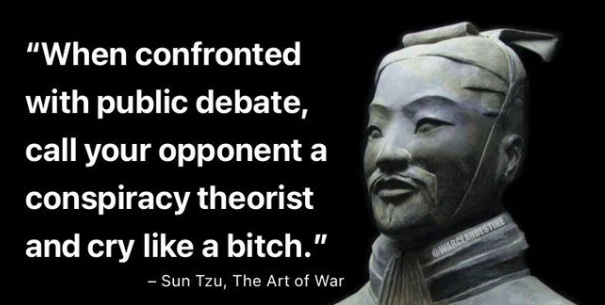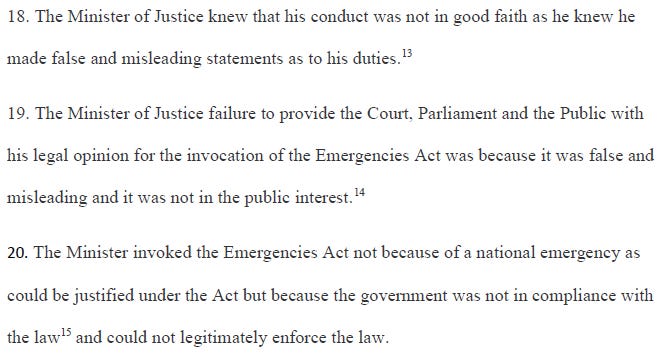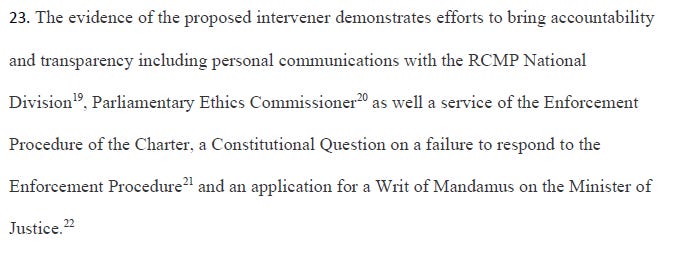My Written Representations to the Federal Court of Appeal
regarding the enforcement of the Emergencies Act by the Liberal Executive of Government
The submissions largely repeat the Motion Record of the Intervener but structured in relationship to the test for leave to intervene.
- Will the proposed intervener make different and useful submissions
- Does the proposed intervener have a genuine interest…knowledge, skills and resources…and dedication.
The motion for leave to intervene is to provide the court with evidence relevant to the inquiry that has not been presented by the other parties.
The evidence of the proposed intervener suggests that the Minister of Justice knew that he was failing to comply his Ministerial duties to protect the public and ensure that the administration of government is in compliance with the law.
The evidence suggests that David Lametti made false and misleading statements to obstruct justice, therefore was not conducting himself with the requisite “good faith” that his office requires and that he knew or ought to have known that a request for accountability was pending in the Court system of British Columbia, regarding his conduct.
The evidence suggests that the PM knew or ought to have known that his Minister of Justice was not conducting himself in “good faith” and was failing in his duties to protect the public and ensure that the administration of justice was in compliance with the law.
The proposed intervener seeks to provide the court this evidence and make the legal arguments in regards to the failure of good faith of the Minister of Justice which is further evidenced by the refusal of David Lametti and the current Minister of Justice Arif Virani to provide the legal opinion provided to Cabinet for invoking the Emergencies Act.
The Proposed Intervener presents unique evidence and legal arguments focused on the allegedly good faith opinion of the Minister of Justice as to the reasons for invoking the Emergencies Act.
This evidence will assist the court in its role in determining the legality of the decision to invoke the Emergencies Act.
There is significant public interest in the decision to invoke the Emergencies Act, the justification and the public right to access a fair and impartial tribunal in compliance with fundamental justice as guaranteed in the Charter of Rights and Freedoms.
….
…
…
25. It is the submission of the intervener that the Minister of Justice invoked the
Emergencies Act because he perceived a threat to national security not from the conduct of the Public but from the conduct of those in authority breaching the Charter requirement for the Rule of Law. Instead of the Minister doing his duty David Lametti made false and misleading statements23 as to his duty to obstruct justice in a display of bad faith which fundamentally compromises the legitimacy of his claim of authority.
…
36. The fundamental issue before the Court is the assertion of the Minister of Justice before Justice Rouleau at the Public that the decision to invoke the Emergency Act was made with the requisite attributes of good faith.
…
39. The Public has a critical but often overlooked perspective in the administration of justice being unequally and unfairly typically the subject with little to no ability to enforce the law against those purporting to have legitimacy in enforcing the law against them.40. The invocation of the Emergencies Act is a matter of immense concern to the Public and their relationship with the Executive of Government as the purported safeguards of Parliament are removed and Cabinet itself is vested with extraordinary powers.
41. The findings of the Federal Court of Appeal in this case have serious implications for the public interest as they fundamentally affect accountability of the Executive to Parliament and the people of Canada as a free and democratic state.
42. The accountability of the Judiciary to the people of Canada is a fundamental
democratic right. The lawful procedure was obstructed by the Minister of Justice
improperly protecting judges from legitimate review by Parliament and failing to protect Canadians from abuses of power. The conduct cannot be defended in a free and democratic state.
43. The Minister of Justice breached his duty. As a protector of the rule of law The
Minister cannot allow that judges could legitimately ignore the transcript to protect a lawyer committing fraud on a court order.
…
45. The current Minister of Justice Arif Virani's position that he is not obliged to disclose the legal advice provided by David Lametti to Cabinet in Council for his reasons to invoke the Emergencies Act is in conflict with his duty to the Public, the actual client of the Minister.
…
46. Granting leave to the proposed intervener will not cause delay or imbalance but will merely place all of the relevant facts that may have affected the decision of the Minister of Justice and Cabinet to invoke the Emergencies Act. Any minor delay in examining the record of the proposed intervener is easily balanced by the interests of the pursuit of justice for Canadians including full disclosure of all evidence.47. The imbalance is currently in the favor of the Minister of Justice as they hide the legal opinion provided to Cabinet by claiming the solicitor – client relationship between the Minister and Cabinet although properly the client of the Minister is the people of Canada. The evidence of the proposed intervener will merely balance the scales of justice by providing evidence that establishes the lack of good faith in the decision of the Minister.
My other substack posts on this issue:
Request for Intervener status at Federal Court of Appeal
Response from Federal Attorney General
Thanks for reading. Have a great day.









